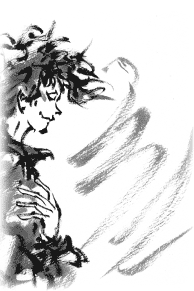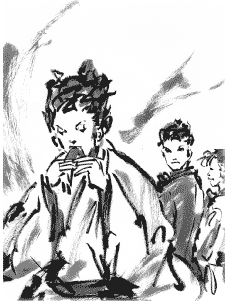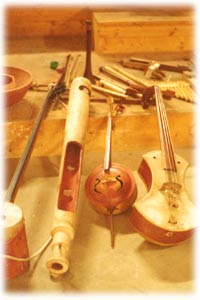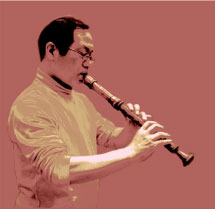 |
 |
| If you try to listen with your eyes
closed for a little while, you can hear various kinds of sounds
coming out of your body incessantly. Breathing, pulse, sounds made
by slight moves of your neck, waist, arms, hands, legs, and even
internal organs. When you put your palm on your heart gently, you
may feel the sounds of your warm body through it. |

Those sounds are so warm that they remind me of my mother's tenderness
I felt when I was a child. They are not just parts of a whole but
the elements indispensable for forming the whole and the deed of
making sounds itself is a proof of our living. Whenever I see something
beautiful, eat something tasty, touch something nostalgic, or smell
good scents, I always wish my mother were alive and could share
my feeling. When she was alive, I did not experience this kind of
emotion so often and even when I did, not this strong . As time
passes, her memory is becoming clearer and clearer, strange as it
may sound. |
Sounds are uttered, heard, felt and then lost. All musical performances
will be gone. But the fact that sounds have to die out affects us
so strongly that they come back to our ears so many times. Man is
also destined to die. That makes his memories much dearer and we
miss him all the more often.
Out of all the sounds made by our bodies, voices would be the clearest.
Using voices we can make songs and words. We use words such as "songs"
or "singing", but it is not that simple and actually we have more
than seven Chinese characters to express these human vocal activities.
Some of them have English equivalents, such as chants, ballads,
and poems. We might as well say the human voice is the mother of
all the musical instruments that man has developed through our long
history. |

Yukio Mishima described the tune of a stone pipe as follows: nobody
but he who has ever heard the tune of a stone pipe could appreciate
it. It has such a divine tune as shakes our hearts and souls. It
sounds extremely clear but at the same time has a warm and opaque
pool like a jewel stone in the depth. It pierces our inmost hearts......"
He stares at the tune firmly with his mind's eye. Among numerous
descriptions about sounds are Jun Takami's "the sounds do not go
up to the sky but creep low on the ground", or Motojirou Yokoi's
"a sound as if wrapped in cotton". |
A cry of "Ah", too short to be a word, could convey various kinds
of human emotions such as surprise, sorrow, disappointment, accusation,
anger, awe, fear, grief, and joy. Limitless possibilities for improvision
lie behind this simple "Ah" sound. The same possibilities are in
one music note in a staff notations.
Five senses gather at one point in the heart and the tuition inspired
out of this crossover stimulates our creativity , which then produces
sounds. Man catches sounds with his five senses and utters sounds
using his intuition. Briefly speaking, to utter sounds is to live,
and to live is to create. |
 According
to the concept of European music in the Middle Ages, there existed
a special dimension where we could hear inaudible sounds of Musica
Mundana and Musica Humana through audible Musica Instrumentalis
. We think the same way about art, seeing things hidden behind the
works. Some may find the similar philosophy in Chinese Reiraku thought.
And this is where we are moved most. According
to the concept of European music in the Middle Ages, there existed
a special dimension where we could hear inaudible sounds of Musica
Mundana and Musica Humana through audible Musica Instrumentalis
. We think the same way about art, seeing things hidden behind the
works. Some may find the similar philosophy in Chinese Reiraku thought.
And this is where we are moved most.
We utter sounds, feel sounds, play with sounds, create sounds, express
ourselves with sounds, and live with sounds. Because being alive
means being with sounds. We live and create sounds. Sounds become
man, and man becomes sounds.
|
| top |

|




 Sounds
become man and man becomes sounds
Sounds
become man and man becomes sounds cross over
cross over  My
Childhood
My
Childhood
